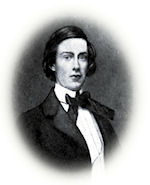August 23.—The Second Fire Zouaves, N. T. S. V., under the command of Colonel James Fairman, left New York for the seat of war. The regiment numbers over seven hundred men, most of whom are well-tried firemen.—N. Y. Herald, August 24.
—A band of secessionists, calling themselves “The Coast Guard,” and commanded by Captain Arnow, from St. Augustine, arrived at Key Biscayne, coast of Florida, at two o’clock this morning, in a boat from the mainland, and at once took possession of the light-house, the dwelling, and all the Government property, and imprisoned the keeper. They then went up into the tower, and destroyed the lens, (and a valuable second order Fresnel illuminating apparatus,) and injured the machinery so badly that it cannot be used again. They reported that Jupiter Light was put out by them on the 20th, and Cape Canaveral some days previous. The party left Key Biscayne after a short stay, proceeding toward Miami in their own boat, and taking a boat belonging to the light-house department.—Simon Frow, in the National Intelligencer, September 9.
—At West Chester, Pa., Deputy United States Marshal Jenkins S. Schuyler, by order of the United States Marshal, took possession of the Jeffersonian newspaper building, with its contents, this afternoon, to await further orders from Washington.—N. T. Times, August 24.
—The Seventeenth and Twenty-first regiments of Massachusetts Volunteers, under the command of Lieutenant-Colonel John J. Fellows and Colonel Augustus Morse, departed for the seat of war.—Idem.
—The State Department at Washington issued the following explanatory notice:
“The regulation of this department of the 19th inst., on the subject of passports, was principally intended to check the communication of disloyal persons with Europe. Consequently passports will not be required by ordinary travellers on the lines of railroads from the United States which enter the British possessions. If, however, in any special case, the transit of a person should be objected to by the agent of this Government on the border, the agent will cause such person to be detained until communication can be had with this department in regard to the case.”
—The Seventh regiment of Maine Volunteers, under the command of Colonel E. C. Mason, U. S. A., left Augusta, Me., for the seat of war. There are in the regiment about eight hundred men. They were hastily organized, and therefore have had but little drill. The organization was made at Augusta, where Company A first went into encampment five weeks ago; some of the other companies were in camp only four or five days. The men are nearly all lumbermen, raftsmen, and farmers, mostly from along the Kennebec and Penobscot rivers. The largest company (A) have ninety men, who, with the exception of a few blacksmiths, are all lumbermen. This company, and Company K, did not have a man rejected at the inspection, nor did one refuse to take the oath of enlistment. The other companies lost each from two to five men in going through these forms.
The regiment have camp equipage complete. Their uniform is light blue pantaloons, dark blue blouses, and the dark blue U. S. regulation infantry caps. They are armed with Windsor rifles and sabre bayonets.
Colonel Mason is yet a regular army officer, holding a captaincy in the Seventeenth U. S. Infantry.—N. Y. Express, August 24.
—The schooner Sarah Ann, Rome, recently purchased by John Douglas Mirridless, of Wilmington, N. C., and registered with the British consul as the William Arthur, of Liverpool, loaded with fish, beef, pork, etc., cleared from Portland, Me., for St. Thomas, and sailed today—but information having been received that her destination was Wilmington, N. C., she was seized down the harbor by the collector of the port and surrendered to the United States marshal under the authority of the act of August 6, confiscating property intended for insurrectionary purposes.—N. Y. World, August 24.
—Isham G. Harris, governor of Tennessee, issued an appeal to the mothers, wives, and daughters of that State, for contributions of clothing, blankets, and other articles “which will contribute to the relief, comfort, and health of the soldier in the field.”—(Doc. 3.)
—There was a great mass meeting in Camden, Me., in favor of a vigorous prosecution of the war. Dr. J. H. Esterbrook presided. Speeches were made by Major Nickerson, of the Fourth regiment, Hon. E. K. Smart, A. P. Gould and D. A. Boody, democrats; and by N. A. Farewell, General Davis Tillson, T. R. Simonton and C. A. Miller, republicans. About three thousand people were in attendance. Great enthusiasm prevailed.—N. Y. Evening Post, August 24.
—The First regiment of Iowa Militia returned to Dubuque from the seat of war in Missouri. The troops were received by thousands, who “turned out to greet them and shout hozannas on their return.” This regiment was one of those who did the hardest fighting in the battle of Wilson’s Creek, Mo.; they were the troops whom General Lyon rallied to the charge with his latest breath.—Dubuque Times, August 24.











